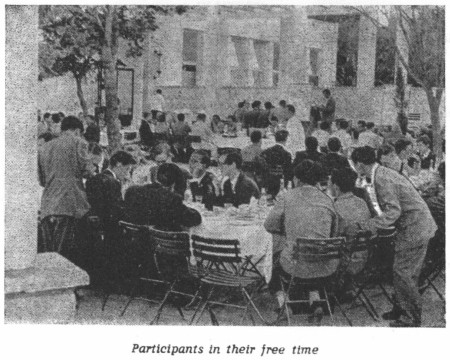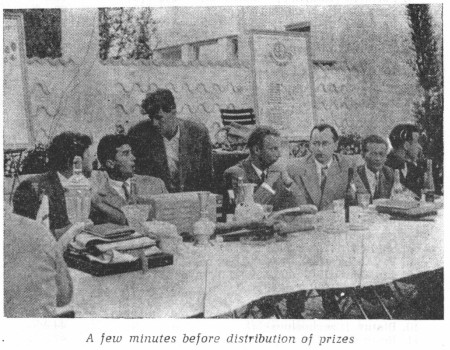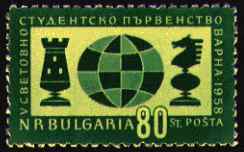|
The World Student Chess Championship has become within a short time one of the most popular of the competitions organised by the International Chess Federation (FIDE). The number of competing teams increases each year and their
quality also shows a steady improvement. It can now be said with confidence that this championship resembles an Olympic event.
 At the FIDE congress in Vienna in 1957 it was decided to entrust the Bulgarian Chess Federation and the International Union of Students with the organisation of the Vth World Student Chess Championship. The Championship was held from 5th to 20th July, 1958 at the well-known spa Zlatni Piasatsi (Golden Sands) near Varna on the Black Sea coast. Only two years ago the construction of hotels was started here and today there are 17 modern hotels, restaurants and all other facilities for tens of thousands of foreign and Bulgarian holidaymakers to enjoy themselves in peaceful and comfortable surroundings. At the FIDE congress in Vienna in 1957 it was decided to entrust the Bulgarian Chess Federation and the International Union of Students with the organisation of the Vth World Student Chess Championship. The Championship was held from 5th to 20th July, 1958 at the well-known spa Zlatni Piasatsi (Golden Sands) near Varna on the Black Sea coast. Only two years ago the construction of hotels was started here and today there are 17 modern hotels, restaurants and all other facilities for tens of thousands of foreign and Bulgarian holidaymakers to enjoy themselves in peaceful and comfortable surroundings.
Sixteen teams from three continents arrived for the opening of the championship. This was a record number of participants, as in Uppsala in Sweden in 1956. Chess players from Albania, Argentina and Ireland, who were attending the student championship for the first time, were welcomed by the teams which had participated in former years. As regards the quality of the players the Varna championship was the best of all student championships held so far. Among those taking part were Tal, Filip, Panno, Ólafsson and Sanguineti, who played in the interzone meeting at Portorož where Tal and Olafsson reached the candidates' tournament, grandmaster Spassky and 8 international masters. The tournament was, therefore, very interesting and in the final group there was a sharp contest.
At a meeting of captains the students' credentials were examined and the teams were divided into four groups, of
which the first two went on the final group, where the 1st to 8th places were contested. The rest formed a second group, where the 9th to 16th places were decided.
The Chairman of FIDE, Mr. Folke Rogard, appointed the international referee Zachari Stanchev (Bulgaria) as chief
referee, and as his deputies Jaroslav Šajtar (Czechoslovakia) and Nicolai Ucharmansky (Bulgaria). The following further members of the Referees' Commission were elected: Mednis (U.S.A.), Gumaelius (Sweden) and Đurašević (Yugoslavia).
 The competitors were greeted at the official opening by the Chairman of the Bulgarian Chess Federation, Georgi Mikhailov, the Vice-chairman of the Varna Town Committee, Christov, on behalf of FIDE by the author of this pamphlet and on behalf of the International Union of Students by the head of the Physical Education and Sport Department of I U S, Kurt Vogel. The tight in the preliminary groups tor placing in the finals was very keen and there were a number of quite surprising results. In the end, however, international experience made itself felt and the favourites won their places in the finals. The competitors were greeted at the official opening by the Chairman of the Bulgarian Chess Federation, Georgi Mikhailov, the Vice-chairman of the Varna Town Committee, Christov, on behalf of FIDE by the author of this pamphlet and on behalf of the International Union of Students by the head of the Physical Education and Sport Department of I U S, Kurt Vogel. The tight in the preliminary groups tor placing in the finals was very keen and there were a number of quite surprising results. In the end, however, international experience made itself felt and the favourites won their places in the finals.
The fight was most intense in the first group, where alongside the Soviet students the team from the German Democratic Republic advanced into the finals after defeating the Rumanians. In the second group the United States and Bulgarian teams advanced as expected, but the Albanian students, newcomers to the championship, also won attention by their enterprising play.
In the third group the favorites, Czechoslovakia and Hungary, also won their way into the finals, but it was this group which nearly produced the. greatest surprise when the Mongolian students seriously threatened their Hungarian colleagues. The steady Improvement shown by the Mongolian chess players is very pleasing. Tumurbator, representing the Mongolian People's Republic, achieved the best result on the second chess board at Varna. In the fourth group the favourites, Yugoslavia and Argentina, also advanced to the finals.
 Apart from the clear victory of the Soviet students the play in the final group was very keen and well-matched. The Soviet team won and thereby retained the title of world champions thanks to the energetic play of the whole team. Special mention must, however, be made of the outstanding play of grandmasters Tal and Spassky, who did not lose a single game. On the first chess board Tal achieved the excellent result of 85% of the points. The Bulgarian students came second and they were the most serious rivals for the Soviet team. Their team was made up of experienced international players, who also form the core of the Bulgarian Olympic team. The weak point in their team was that its reserve players were not up to standard and therefore the first foursome had to play the majority of the matches. The Bulgarian player Tringov achieved the best individual result on the fourth chess board with
6½ points in 9 games, i. e. 72.2%. Apart from the clear victory of the Soviet students the play in the final group was very keen and well-matched. The Soviet team won and thereby retained the title of world champions thanks to the energetic play of the whole team. Special mention must, however, be made of the outstanding play of grandmasters Tal and Spassky, who did not lose a single game. On the first chess board Tal achieved the excellent result of 85% of the points. The Bulgarian students came second and they were the most serious rivals for the Soviet team. Their team was made up of experienced international players, who also form the core of the Bulgarian Olympic team. The weak point in their team was that its reserve players were not up to standard and therefore the first foursome had to play the majority of the matches. The Bulgarian player Tringov achieved the best individual result on the fourth chess board with
6½ points in 9 games, i. e. 72.2%.
Czechoslovakia, Yugoslavia and Hungary gained the third to fifth places. All three teams had alternating successes and failures to about the same extent. Following their good results in the preliminary group the United States players were expected to have greater success in the finals and the Argentine players are also probably not fully satisfied with their placing. Alongside a good average on the first three chess boards the fourth board was their weakest point. The German Democratic Republic's team was also disappointing, for after their success in the preliminary group better results were expected of them. They seem to have been rather excessively depressed by their heavy defeat by the United States team in the third round.
In the second group the Rumanians had a clear win over Iceland. The order of the remaining teams corresponds with their standard in the tournament. It may be mentioned that the Polish player Sydor obtained the best individual result on the third board with the excellent achievement of 8 points in 10 games, i. e. 80%.
 The decision of the organisers of the tournament — the Bulgarian Chess Federation, the chess section of the "Akademik" sports organisation and the International Union of Students — to hold the Vth World Student Chess Championship at "Golden Sands" was a very happy one. The organisers arranged excellent accommodation and catering tor all participants. Bathing in the Black Sea and trips into the surrounding country provided welcome relaxation. Local enterprises adopted individual teams, arranged friendly meetings with them and presented their members with souvenirs. The Vth Student Championship aroused exceptional interest and spectators followed the battles on the chess boards with great interest. The press and wireless gave full reports of the course of the championship standings and the tournament contributed to the strengthening of friendly contacts among student chess players from three continents. The decision of the organisers of the tournament — the Bulgarian Chess Federation, the chess section of the "Akademik" sports organisation and the International Union of Students — to hold the Vth World Student Chess Championship at "Golden Sands" was a very happy one. The organisers arranged excellent accommodation and catering tor all participants. Bathing in the Black Sea and trips into the surrounding country provided welcome relaxation. Local enterprises adopted individual teams, arranged friendly meetings with them and presented their members with souvenirs. The Vth Student Championship aroused exceptional interest and spectators followed the battles on the chess boards with great interest. The press and wireless gave full reports of the course of the championship standings and the tournament contributed to the strengthening of friendly contacts among student chess players from three continents.
All who had taken part in the championship left the Bulgarian Peoples' Republic with a feeling of satisfaction and the knowledge that the motto of FIDE "Gens una sumus" had again been proved in practice.
 Their is no doubt that the next World Student Championship, will make a further contribution to the development
of chess among students throughout the world and to the strengthening of their mutual friendly co-operation on an international scale. Their is no doubt that the next World Student Championship, will make a further contribution to the development
of chess among students throughout the world and to the strengthening of their mutual friendly co-operation on an international scale.
/ Ing. Jaroslav Šajtar, International Chess Master and Vice-President of FIDE /
|

